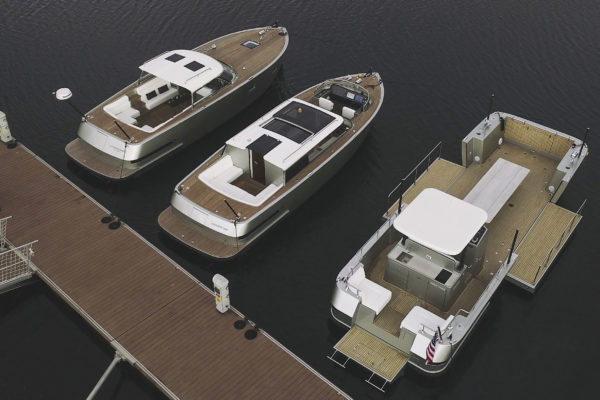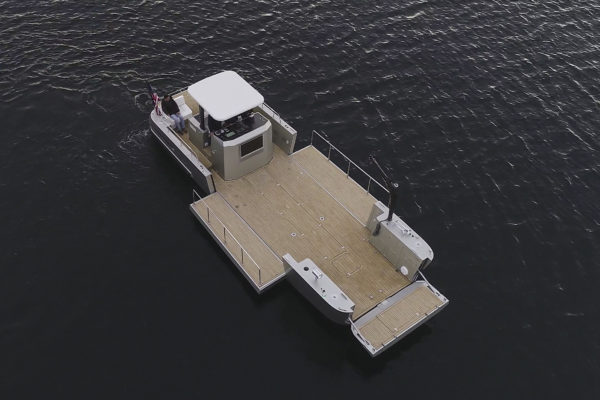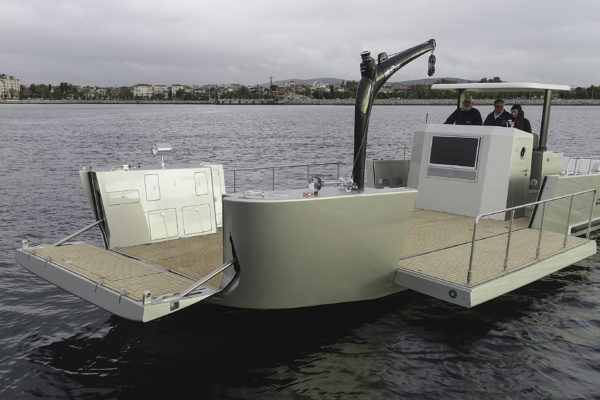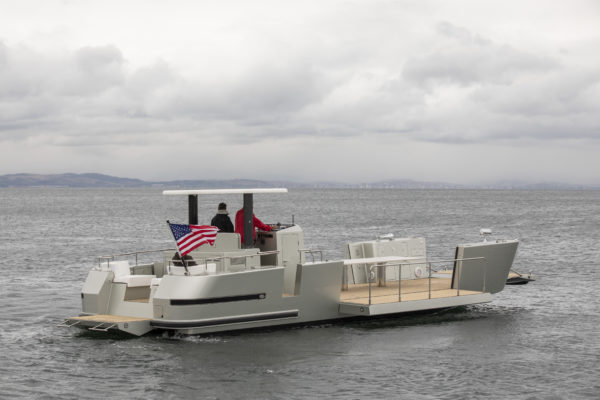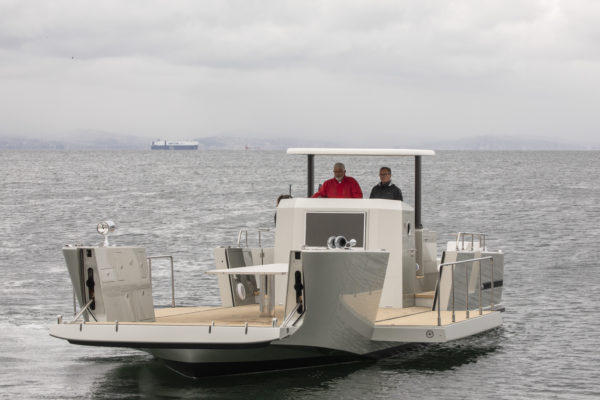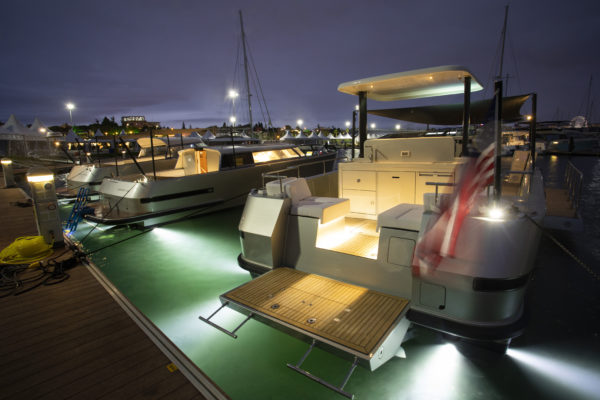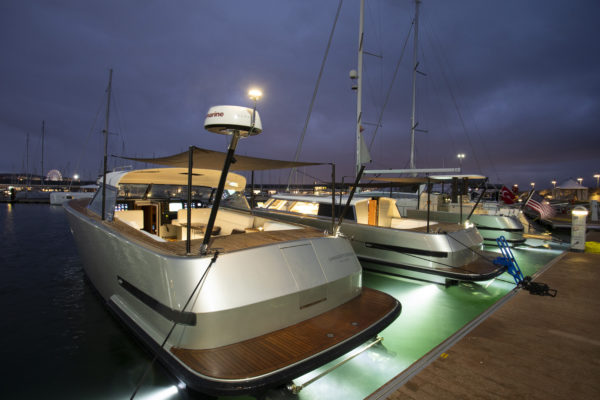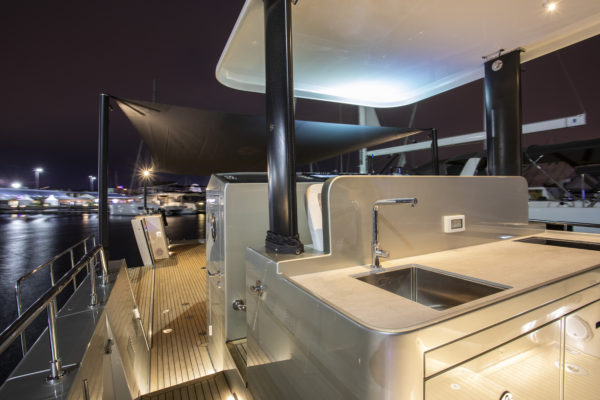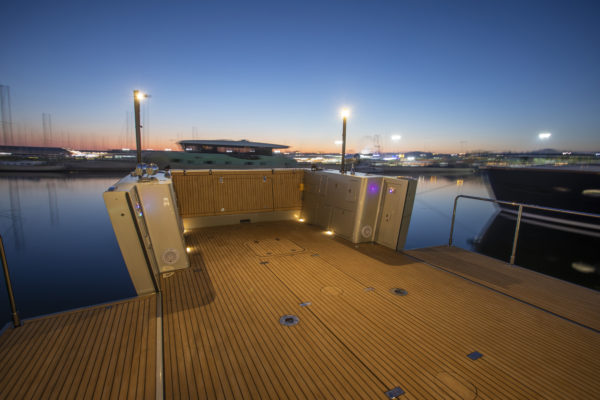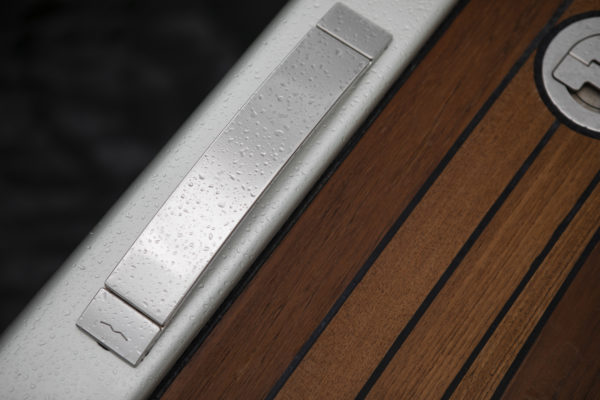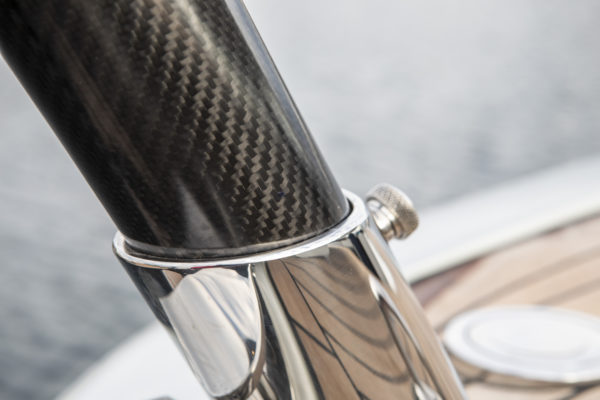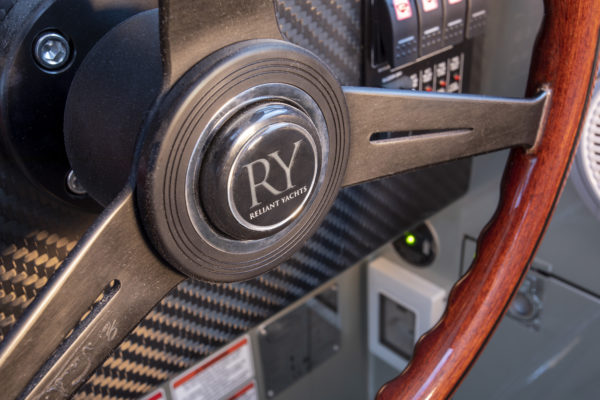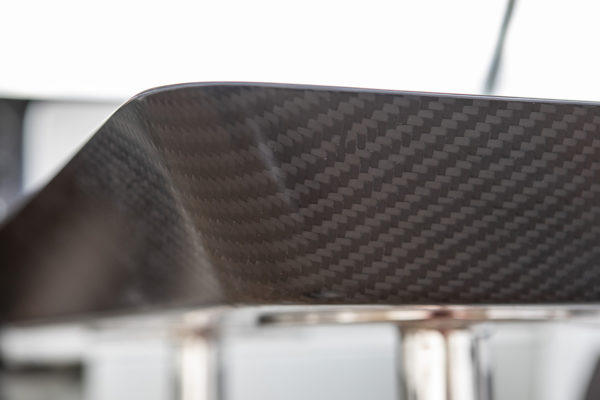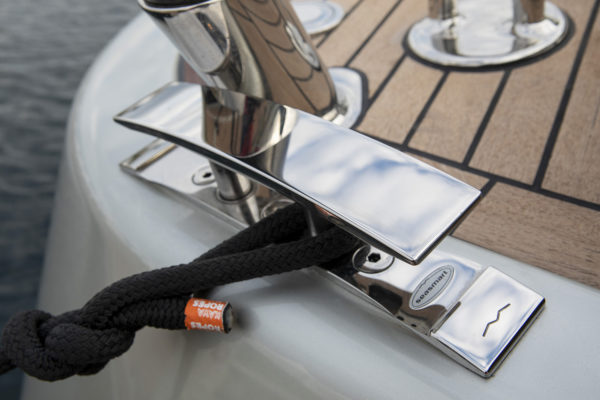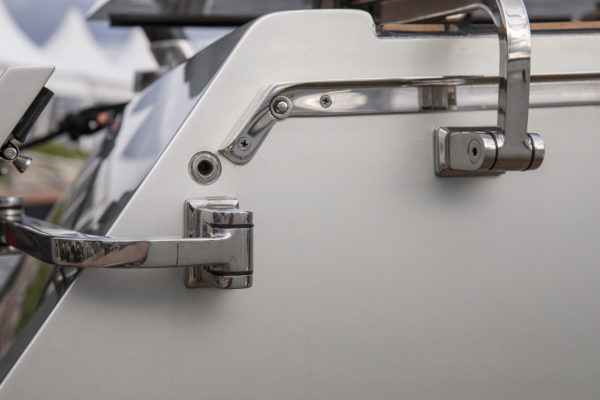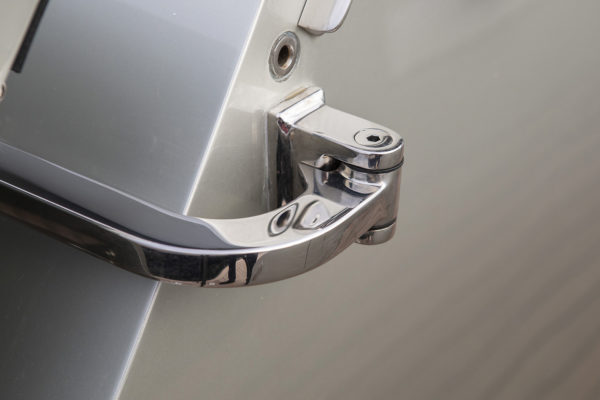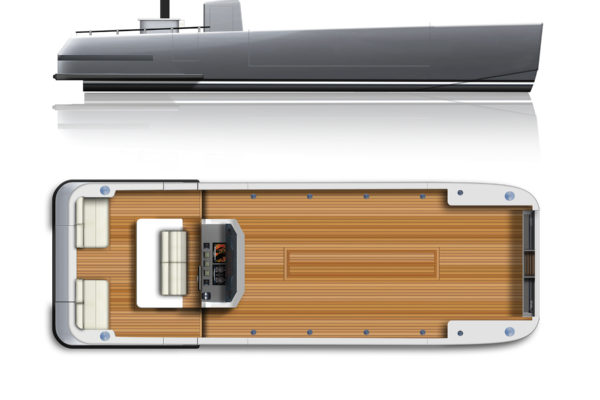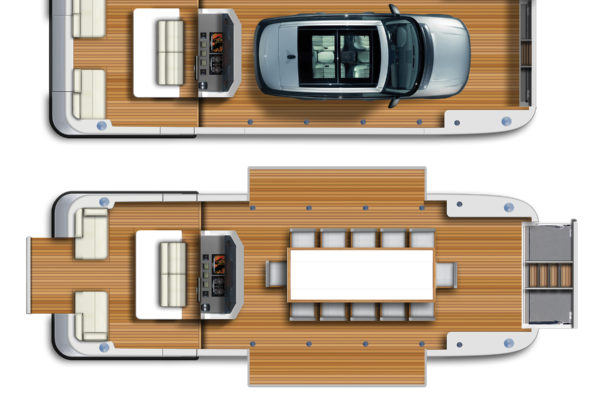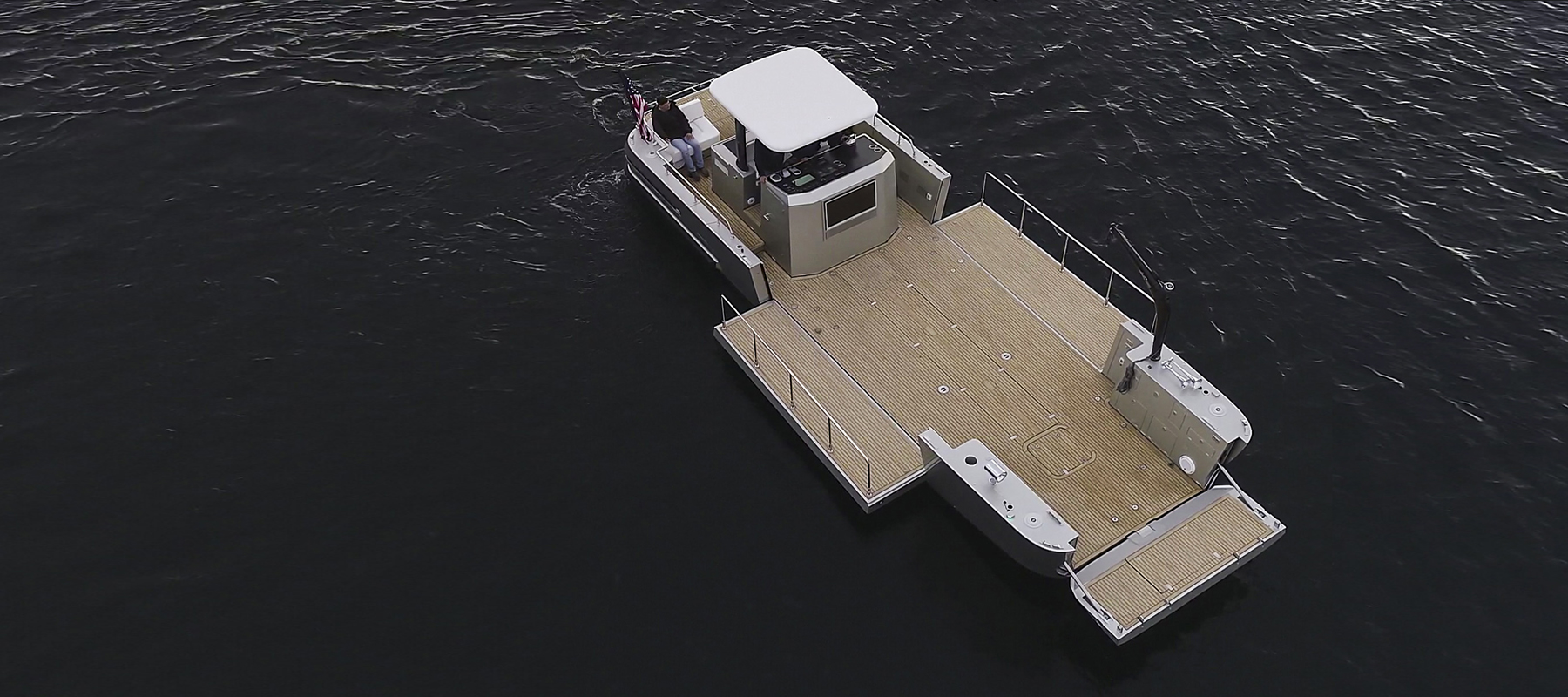
X40L Lander
A 40-foot utility boat in the service of a superyacht must above all be practical, always ready to load and deliver bulky, heavy stores and equipment. Yet it can become much, much more than that, which is what happened with the X40L, a tender that can serve as a working craft in the morning and a luxury SUV in the afternoon. Invite a crowd of your friends aboard for an afternoon at the beach and later, motor to a secluded inlet for cocktails and al fresco dining.
Designed for a client with a superyacht under construction, the X40L evolved in the imagination of Reliant Yachts’ partners Jim Ewing and Dave MacFarlane in collaboration with their client. The design brief required that the boat function as a landing craft and be able to carry considerable loads, including an automobile.
By the time it was launched in the summer of 2018 in Tuzla, Turkey, “The X40L had become much, more versatile,” Ewing says. “It’s a superyacht luxury tender, car carrier, utility vehicle, landing craft, dining tender, scuba platform, water disco, floating galley, and jet boat.”
With a landing-craft-style drop-down bow to accommodate a car or other vehicles rolling on and off, the X40L was equipped for shoal water by fitting Hamilton jet drives rather than conventional shaft propellers. Pop-up hydraulic winches were installed to kedge the boat ashore and then off again. Removable carbon davits can also be mounted to lift heavy cargo on and off the dock.
But the thinking evolved further. Why not turn this vessel into a party platform when its work was done for the day? Most yachts have a “teak beach” as a stern platform; why not give this “Lander” a rugged Flexi-teak deck and take a party of guests to the beach?
The designers didn’t stop there, placing a full outdoor galley aft of the helm station and then installing a stone-top dining table seating 14 that lifts from under the deck via a 24-volt DC electric motor. Carbon-fiber “wing” doors fold down to expand the party space, and on bright sunny days, an overhead canopy can be rigged. Of course, a powerful entertainment system with Apple Airplay plays music and movies, and dramatic footlighting and underwater lights set the party mood. As with the Express and Limo, the X40L also provides a wifi network to it’s passengers courtesy of a simcard loaded into the entertainment system router.
It’s an open boat, so what about, er, certain facilities? Fear not. A small cabin in the helm console includes an air-conditioned head and extra storage space.
In profile, the X40L looks much like her sisterships, which are express and limousine style 40-footers that fit abreast in their mothership’s garage. The three boats have similar profiles with nearly plumb bows, sloping sheerlines, and reverse-angled transoms. But from the drone’s-eye view, things look quite different; the full deck beam is evident from bow to stern on the X40L (the “L” stands for “Lander”).
The design of the hull is complex, because it needed to accommodate variable weight distribution. At any given time, the forward areas of the boat might be loaded down with heavy cargo or a couple thousand pounds of cocktail crew. At other times, that section may be empty. The solution was a broad beam extended all the way forward to carry the weight when loaded, yet hiding below the bluff bow are much slimmer hull sections on which the boat runs easily in a light-load condition. Additionally, ballast tanks can be monitored and controlled from the helm station to trim the X40L when empty of cargo.
Reliant chose a different hull material for this boat as well. Instead of building of epoxy and cold-molded wood, the X40L is built of aluminum, befitting the durability needs of a utility vessel. Yet matched with her the’ disappearing cleats and winches by Sea Smart, classy caprail, and metallic silver paint job of her sisterships, this boat looks cleans up smartly as any yacht tender should.
Also similar to her sisterships, the X40L has a helm station fully fitted with Raymarine autopilot, radar, AIS, chart plotter, GPS, VHF, speed and depth instrumentation.
At 24,250 pounds, the Lander is a third heavier than the other two boats and carries extensive equipment plus fuel, freshwater, ballast, and black- and gray-water tankage under its clean wide decks. Besides the twin Cummins QSB6.7 355IDI diesels, it is fitted with a Seakeeper3 gyro, Onan generator, Webasto air conditioning, a custom hydraulics system for the doors—plus Siemens dishwasher, Dometic refrigerator/freezer, Siemens microwave and Franke cooktop in the galley.
To maintain a reasonable overall displacement, Reliant made extensive use of lightweight carbon fiber wherever possible including the folding aft and side doors, the helm console, hard top, and galley station.
In light winds and calm seas, with two crew aboard and carrying no extra weight or ballast, the X40L cruised at 11 to 16 knots and wide open hit 24.1 kts. Unballasted but with a vehicle on board, the boat cruised at 10 to 12 knots and had a top speed of 16.4.
| RPM | 600 | 900 | 1200 | 1500 | 1800 | 2100 | 2400 | 2700 | 2860 |
|---|---|---|---|---|---|---|---|---|---|
| SPEED/LIGHT | 2.9 | 4.2 | 5.8 | 7.0 | 8.0 | 9.1 | 11.4 | 18.3 | 24.1 |
| SPEED/LOADED | 1.5 | 4.2 | 5.5 | 6.8 | 7.8 | 8.7 | 9.8 | 13.6 | 16.4 |
| FUEL RATE/LIGHT G/H | 0.8 | 1.5 | 3.4 | 5.8 | 9.9 | 15.5 | 20.4 | 31.0 | 36.4 |
| FUEL RATE/LOADED G/H | 0.8 | 1.5 | 3.4 | 5.9 | 10.0 | 16.1 | 20.4 | 31.0 | 36.4 |
| Length | 37' 9" | 11.5m |
| Beam | 12' 8" | 3.87m |
| Draft | 2' 0" | 600mm |
| Height | 9' 6" | 2.89m |
| Displacement | 24,250 lbs | 11,000 kg |
| Power | Cummins QSB6.7 425hp | Konrad 660B Stern Drive |
| Fuel | 132 gal | 500 l |
| Water | 200 gal | 750 l |
| Top Speed | 24.1 lightship | 16.4 vehicle on board |


